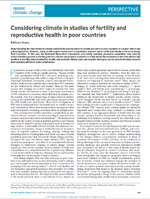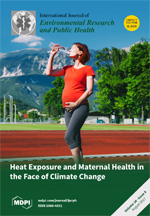-
Climate Change and Women’s Health: New Studies Find Overlooked Links
September 19, 2017 By Antony Martel The intersection of reproductive health and climate change is an understudied nexus in academic literature. In her Nature article, “Considering Climate in Studies of Fertility and Reproductive Health in Poor Countries,” Kathryn Grace looks at how studies of contemporary fertility transitions are better served when they include the impacts of climate change.
The intersection of reproductive health and climate change is an understudied nexus in academic literature. In her Nature article, “Considering Climate in Studies of Fertility and Reproductive Health in Poor Countries,” Kathryn Grace looks at how studies of contemporary fertility transitions are better served when they include the impacts of climate change.Conventional theories of demographic transitions explore how patterns of geography, history, norms, and economic development shape a country’s demography. Grace points out that climate impacts, such as rising temperatures, can be a vital addition to these perspectives. Climate and reproductive health intersect to influence nutrition, food security, resource scarcity, and income, as well as patterns of time use and physical labor. For example, early findings indicate that pregnant women are adversely affected by potential climate impacts, such as increased labor, psychological stress, nutritional deficiency, and rising temperatures.
More research is needed to improve our understanding of climate’s impact on reproductive health, but acquiring more data will require a uniform method for collection. Grace proposes to “expand the UN’s EDGE data to include more countries and more health data” in order to better understand these intersections.
 “Heat is possibly the climate-related illness of greatest concern,” said Leeann Kuehn and Sabrina McCormick in their survey of 6,450 studies on the effects of rising temperatures on pregnant women. In “Heat Exposure and Maternal Health in the Face of Climate Change,” published in the International Journal of Environmental Research and Public Health, the authors argue that pregnant women are an “at-risk” group that should be included alongside other categories of vulnerability in research on climate and health.
“Heat is possibly the climate-related illness of greatest concern,” said Leeann Kuehn and Sabrina McCormick in their survey of 6,450 studies on the effects of rising temperatures on pregnant women. In “Heat Exposure and Maternal Health in the Face of Climate Change,” published in the International Journal of Environmental Research and Public Health, the authors argue that pregnant women are an “at-risk” group that should be included alongside other categories of vulnerability in research on climate and health.Heat-susceptible individuals are currently defined as “poor, elderly, young children, minority groups, outdoor workers, individuals with chronic respiratory or cardiovascular disorders, socially isolated individuals, and living in an urban heat island.” Kuehn and McCormick look to add pregnancy to this group by demonstrating how heat affects women at all stages of gestation.
In their analysis, the authors determined that exposure to unusually hot temperatures can lead to changes in length of gestation, birth weight, stillbirth rates, and neonatal stress. Climate change’s accelerating impact on global temperatures will make heat a more serious threat to maternal health going forward. Kuehn and McCormick suggest studies on heat and health should follow uniform measurements to promote better policymaking.
Sources: International Journal of Environmental Research and Public Health, Nature, United Nations Department of Economic and Social Affairs
 A Publication of the Stimson Center.
A Publication of the Stimson Center.

 The intersection of reproductive health and climate change is an
The intersection of reproductive health and climate change is an  “Heat is possibly the climate-related illness of greatest concern,” said Leeann Kuehn and Sabrina McCormick in their survey of 6,450 studies on the effects of rising temperatures on pregnant women. In “
“Heat is possibly the climate-related illness of greatest concern,” said Leeann Kuehn and Sabrina McCormick in their survey of 6,450 studies on the effects of rising temperatures on pregnant women. In “

